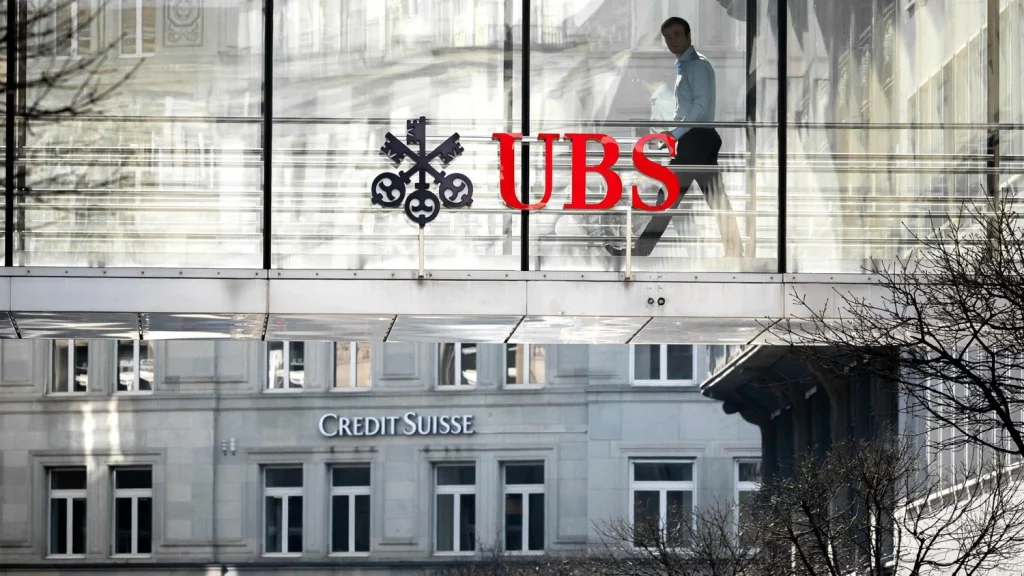On Sunday, UBS agreed to acquire its troubled competitor Credit Suisse for 3 billion Swiss francs ($3.2 billion), with Swiss regulators playing a key role as governments worldwide sought to halt a financial contagion.
The Swiss National Bank, along with the Swiss government and the Swiss Financial Market Supervisory Authority, collaborated to bring about the merger of the two largest banks in Switzerland, Credit Suisse and UBS. The merger “has been found to secure financial stability and protect the Swiss economy in this exceptional situation,” the statement read.


According to the terms of the deal, shareholders of Credit Suisse will receive one share of UBS for every 22.48 shares of Credit Suisse they own.
“This acquisition is appealing to UBS shareholders; however, it should be made clear that, from Credit Suisse’s perspective, this is an urgent matter requiring immediate attention. “We have structured a transaction that will preserve the value left in the business while limiting our downside exposure,” said UBS Chairman Colm Kelleher in a statement.
UBS estimates that the combined bank will have $5 trillion in assets
“We’re dedicated to making this transaction a huge success. There are no options in this,” Kelleher said when asked during the press conference if the bank could back out of the deal. To quote the Swiss government: “This is absolutely essential to the financial structure of Switzerland and… to global finance.”
The takeover will be supported by a loan from the Swiss National Bank of up to 100 billion Swiss francs ($108 billion). In addition, the Swiss government issued a guarantee to assume losses of up to 9 billion Swiss francs from specific assets above a specified threshold “in order to reduce any risks for UBS,” according to a separate government statement.
“This is a commercial solution and not a bailout,” said Karin Keller-Sutter, the Swiss finance minister, in a press conference Sunday.
After Credit Suisse stock suffered its worst weekly decline since the start of the coronavirus pandemic, the UBS deal was hastily put together before markets reopened on Monday. Even though the Swiss central bank granted a new loan of up to 50 billion Swiss francs ($54 billion) last week to try to stop the slide and restore confidence in the bank, the losses continued.
Treasury Secretary Janet Yellen and Federal Reserve Chair Jerome Powell issued a joint statement praising the agreement. U.S. banks have ample reserves of capital and liquid assets, and the country’s financial system is stable. We have been in constant communication with our foreign partners to encourage their adoption, they said.
Struggles of Credit Suisse
Credit Suisse has been struggling with a number of setbacks and scandals recently, and the recent failures of Silicon Valley Bank and Signature Bank in the United States have further shaken investor confidence.
The shock has not been contained, and it threatens to engulf more banks in the United States and around the world, despite the fact that U.S. regulators have created a new funding facility for troubled financial institutions and guaranteed uninsured deposits in the failed banks.
The financial instability caused by the failure of U.S. regional banks came at the wrong time, Credit Suisse Chairman Axel Lehmann said at a press conference.
According to sources who spoke with CNBC’s David Faber, UBS will have full control over the acquired assets after the pairing is approved by regulators.
Pressure for Swiss Regulators
Swiss regulators were under pressure to find a way to merge the country’s two largest financial institutions because Credit Suisse is much larger and could have a greater impact on the global economy than U.S. regional banks. Credit Suisse’s balance sheet is approximately 530 billion Swiss francs larger than Lehman Brothers was at the time of its collapse in 2008. Since Credit Suisse has a number of international branches, efficient management of the company’s affairs is all the more crucial.
There were some difficulties in reconciling the two rivals, but the pressure to avoid a systemic crisis ultimately won out. Several media outlets reported on Sunday that UBS made a preliminary offer to acquire Credit Suisse for around $1 billion. People familiar with the matter told Bloomberg that Credit Suisse rejected the offer because it was too low and would harm shareholders and employees.
Sources told CNBC’s Faber that UBS was in talks to acquire the bank on Sunday afternoon for a price “substantially” higher than 1 billion Swiss francs. He claimed that the cost of the deal had risen as discussions continued throughout the day.
Credit Suisse reported early last week that outflows have not yet reversed after the company lost around 38% of its deposits in the fourth quarter of 2022. An annual net loss of 7.3 billion Swiss francs was reported for 2022, and a “substantial” loss is anticipated for 2023.
Before current CEO and Credit Suisse alumnus Ulrich Koerner took over in July, the bank had announced a massive strategic overhaul to address these chronic issues.




